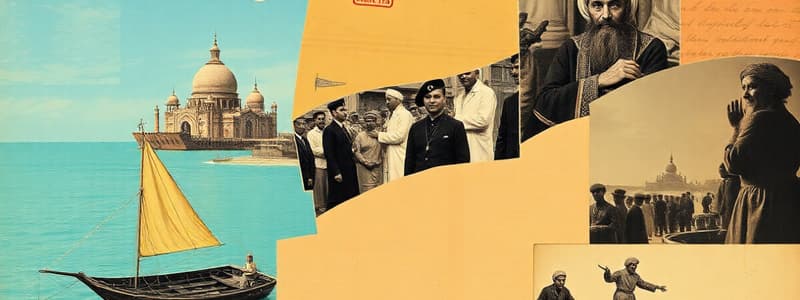Podcast
Questions and Answers
What is the practice when someone meets the qádi or preacher?
What is the practice when someone meets the qádi or preacher?
- They greet him with a bow.
- They present a gift.
- They wear a specific garment.
- They uncover their back. (correct)
What is required of every person entering a house?
What is required of every person entering a house?
- To present their identity.
- To wash their feet. (correct)
- To bring a gift.
- To remove their shoes.
What material is used to make cords for sewing ships together?
What material is used to make cords for sewing ships together?
- Coconut integument. (correct)
- Cotton threads.
- Hemp fibers.
- Animal hides.
Which of the following items is NOT exported from the islands mentioned?
Which of the following items is NOT exported from the islands mentioned?
What is the role of cowrie shells in the economy of these islands?
What is the role of cowrie shells in the economy of these islands?
How did the inhabitants react to the qádí's orders regarding clothing for women?
How did the inhabitants react to the qádí's orders regarding clothing for women?
What ratio of cowrie shells to gold dinar is typically used in trade?
What ratio of cowrie shells to gold dinar is typically used in trade?
What prompted Ibn Battutah's extensive travels?
What prompted Ibn Battutah's extensive travels?
What aspect of their attire do the women of these islands typically avoid?
What aspect of their attire do the women of these islands typically avoid?
Which of the following describes the primary living conditions of the people in the Maldive Islands according to Ibn Battutah?
Which of the following describes the primary living conditions of the people in the Maldive Islands according to Ibn Battutah?
Which material is predominantly used in the construction of buildings in the Maldive Islands?
Which material is predominantly used in the construction of buildings in the Maldive Islands?
What unique aspect of the Maldive Islanders is highlighted by Ibn Battutah regarding their approach to cleanliness?
What unique aspect of the Maldive Islanders is highlighted by Ibn Battutah regarding their approach to cleanliness?
How did Ibn Battutah support his travels within the Islamic world?
How did Ibn Battutah support his travels within the Islamic world?
What was one significant outcome of Ibn Battutah's memoirs?
What was one significant outcome of Ibn Battutah's memoirs?
What unusual fact did Ibn Battutah note about the local response to crime?
What unusual fact did Ibn Battutah note about the local response to crime?
What distinguishes Ibn Battutah's style of writing in his travelogue?
What distinguishes Ibn Battutah's style of writing in his travelogue?
Flashcards
Ibn Battutah's Travels
Ibn Battutah's Travels
Extensive journeys across the Islamic world, covering a vast geographic area, including West Africa and China.
Maldives People
Maldives People
Religious, honest, and non-violent individuals, described by Ibn Battutah as people who rely on prayer instead of arms.
Ibn Battutah's Book
Ibn Battutah's Book
A travelogue (travel writing) meticulously detailing his journey, considered an accurate record but potentially incorporating information from other travelers, written orderly and lively.
Islamic World
Islamic World
Signup and view all the flashcards
Maldives Architecture
Maldives Architecture
Signup and view all the flashcards
Indian Pirates
Indian Pirates
Signup and view all the flashcards
Ibn Battutah's Profession
Ibn Battutah's Profession
Signup and view all the flashcards
Maldivian Hygiene
Maldivian Hygiene
Signup and view all the flashcards
Island Inhabitants' Clothing
Island Inhabitants' Clothing
Signup and view all the flashcards
Island Greetings and Etiquette
Island Greetings and Etiquette
Signup and view all the flashcards
Cowrie Shells as Currency
Cowrie Shells as Currency
Signup and view all the flashcards
Coconut-Based Ship Cordage
Coconut-Based Ship Cordage
Signup and view all the flashcards
Island Trade Items
Island Trade Items
Signup and view all the flashcards
Qadi's Unsuccessful Efforts
Qadi's Unsuccessful Efforts
Signup and view all the flashcards
Cowrie Shell Value Fluctuation
Cowrie Shell Value Fluctuation
Signup and view all the flashcards
Island Women's Clothing Customs
Island Women's Clothing Customs
Signup and view all the flashcards
Study Notes
Ibn Battutah's Account of the Maldives
- Ibn Battutah, a 14th-century Muslim traveler, described the Maldives in his account of travels.
- He observed the islanders as upright, pious, and peaceful, relying on prayer as defense.
- Their physical attributes were weak, suggesting a non-warlike culture.
- The people maintained exceptional cleanliness, bathing frequently.
- Their clothing was exceptionally simple, utilizing mostly aprons and cloths.
- Islanders treated religious leaders with respect, uncovering their backs.
- They were barefoot and meticulously maintained their streets.
Maldivian Economy and Culture
- The Maldives exported fish, coconuts, cloth, cotton turbans, brass utensils, cowrie shells, and ganbar (coconut fiber).
- Ganbar, a tanned coconut fiber, was highly valued for its superior strength in ship-repairing and was exported to India, China, and Yemen.
- Cowrie shells served as currency. Prices varied greatly, from 400,000 shells per gold dinar, to 1,200,000 per dinar.
- Shells were traded with neighboring regions, including Bengal and Yemen.
- The women of the Maldives wore only aprons. Ibn Battutah's attempts to compel them to wear more clothing were unsuccessful.
Studying That Suits You
Use AI to generate personalized quizzes and flashcards to suit your learning preferences.



